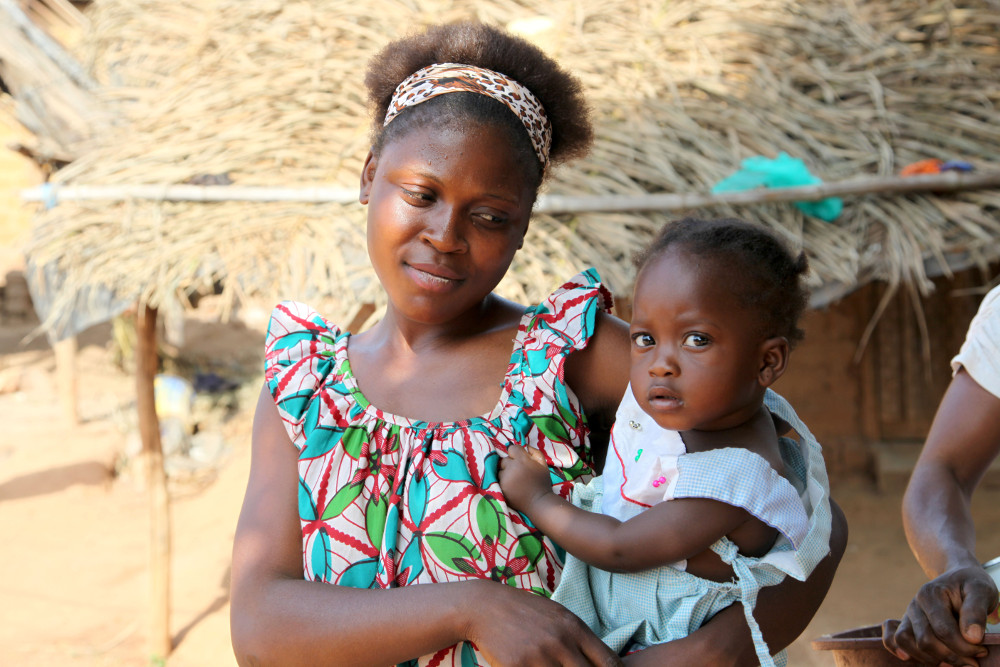 Photo: Thibaut Monnier (Ayoukit)/Bernard van Leer Foundation
Photo: Thibaut Monnier (Ayoukit)/Bernard van Leer Foundation
 Photo: Thibaut Monnier (Ayoukit)/Bernard van Leer Foundation
Photo: Thibaut Monnier (Ayoukit)/Bernard van Leer Foundation
What began with two people, an idea and a laptop in a cramped basement office in London has developed in less than two years into a dynamic platform for investment into nutrition programmes in some of the poorest countries in Africa and Asia. By securing commitments from governments and donors to match private donations, The Power of Nutrition is able to incentivise new actors to get involved in this important area.
In recent months, much of the world’s attention has been absorbed – rightly – by the humanitarian challenge of feeding people in areas of north Africa affected by famine and acute hunger. Providing food to those who are hungry is of course a vital response, but it is not enough and on its own will not prevent undernutrition. In fact, undernutrition can just as easily exist in a situation of plenty. One senior African official recently described the situation in his own country: ‘We have a lot of food, but you might find that places with a lot of food also have a lot of malnutrition.’
The challenge is not so much lack of knowledge – most of the causes of undernutrition are understood and can be treated – as the need for increased investment. The scale of the problem is clear and urgent, and is worth restating. Nearly one in four children under the age of 5 suffers from the development consequences of long-term undernutrition – that is, their growth is stunted – because they have not received the nutrients they need in their first thousand days of life (International Food Policy Research Institute (IFPRI), 2016).
Pause for a minute and think about the implications of this statistic: of every four young children in the world today, one is likely to be less healthy than her peers and to do less well at school; she is destined to earn less and live with the long-term physical and mental impacts of undernutrition. If she becomes pregnant, she is more likely to give birth to a baby which is smaller and weighs less than it should, passing on the damaging effects of undernutrition to a new generation. Today 156 million children have been handed a life sentence of being stunted in their physical and cognitive development.
The long-term costs of poor nutrition are also immense for countries, which can lose up to 11% of GDP. Investing in nutrition is vital if the world – and especially the least developed countries – are to achieve their full potential. But relatively modest investments could reap big results, and quickly. The World Bank has estimated that for an additional USD 49.5 billion, the number of stunted children can be reduced by 40% by 2025 (Shekar et al., 2017).
For many years, the expected solution to a long-term development challenge such as undernutrition has been for governments in OECD member countries to provide overseas aid. This has certainly had a major impact: the proportion of children who are either undernourished or hungry is substantially less than it was 25 years ago. But progress has not been rapid enough or at a sufficient scale to prevent and begin to roll back the continuing impact of undernutrition.
The challenge is not so much lack of knowledge – most of the causes of undernutrition are understood and can be treated – as the need for increased investment.
To achieve that scale, we need to do a much better job of engaging with national governments and the private sector. This has been at the centre of the discussions on undernutrition – including Nutrition for Growth, a partnership between the governments of the United Kingdom, Brazil and Japan that began with a high-level summit in London in 2013 – that culminated in the second Sustainable Development Goal on Ending Hunger, Achieving Food Security and Promotion of Sustainable Agriculture, agreed two years ago.
The Power of Nutrition was born out of a conversation at that summit in 2013, and formally launched in the Spring of 2015 at the World Bank, with support from its partners – the UK Government’s Department for International Development (DFID), the Children’s Investment Fund Foundation (CIFF), the UBS Optimus Foundation, UNICEF and the World Bank. These partners agreed that a dynamic new platform was needed to generate greater and more strategic involvement from the private sector – including large corporations, private philanthropies, investors and wealthy individuals.
The idea behind The Power of Nutrition is to provide increased incentives for these private investors to pool resources. With generous support from our founders, implementing partners (the World Bank and UNICEF) and governments in countries where we develop programmes, The Power of Nutrition matches each new dollar for nutrition with three additional dollars when they are invested in a country programme to scale up evidence-based interventions to prevent and treat undernutrition.
We work closely with our implementing partners and with national governments to develop programmes with the maximum potential nutritional impact for children. Each programme supports proven interventions and national plans. As part of our programme negotiation, we also agree monitoring and evaluation plans with detailed and ambitious targets to ensure progress is on track. Combined, this approach enables our investments to have a dramatic impact on the lives of individuals, families, their communities and the economies in which they live and work.
In just two years, The Power of Nutrition has so far developed and started funding programmes worth close to USD 100 million, bringing in substantial new investments from philanthropies and the private sector. Our programmes are in countries with the highest levels of undernutrition, in Africa and Asia. Already, we have programmes funded in Tanzania and Ethiopia (through the World Bank) and Liberia (through UNICEF), with other potential country programmes being explored in Benin, Madagascar and India.
In Tanzania and Ethiopia, the focus is on strengthening the health system to be able to support improved nutrition for those most at risk, for example by ensuring women and children have access to micronutrients, and training health workers in the most effective techniques to educate women about the need to exclusively breastfeed babies for the first six months of life, followed by introduction of nutritious complementary food to promote healthy mental and physical development of their children.
In Liberia, the focus is on support for rebuilding the health system, and trust in the system, following the immense damage done by the recent Ebola epidemic, including critical nutrition interventions for women of reproductive age and for children. The programme provides technical support to health workers to help them deliver nutrition interventions as part of their community health work and outreach.
Since The Power of Nutrition was created, we have learned important lessons on how to build partnerships by engaging with national governments and speaking the language of the private sector – because, if we see the private sector as a partner, we must be clear about what is in it for them. The challenge now is to ensure that scale and quality advance together, and that we are able to show continued progress and clear evidence to keep nutrition high on the list of global priorities.
References can be found in the PDF version of the article.



See how we use your personal data by reading our privacy statement.
This information is for research purposes and will not be added to our mailing list or used to send you unsolicited mail unless you opt-in.
See how we use your personal data by reading our privacy statement.